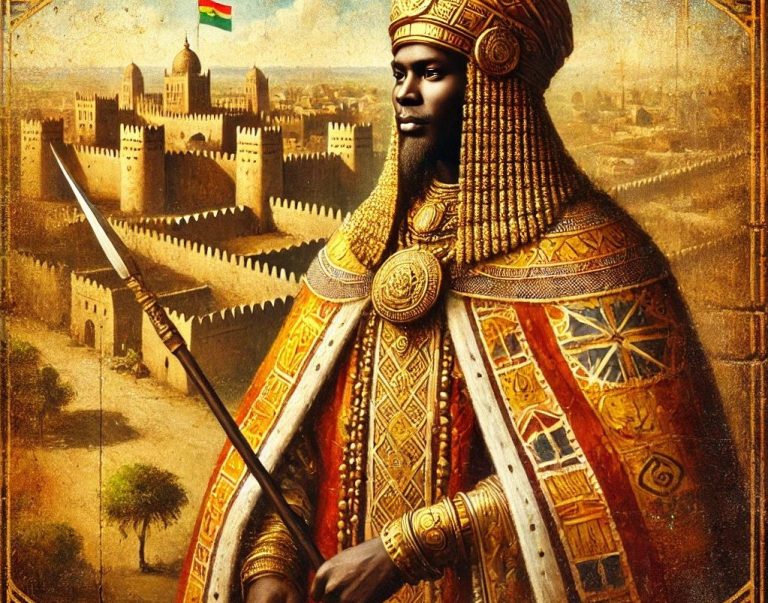Sundiata Keita
Beneath the boundless African sky,
Where golden rivers weave and sigh,
A kingdom trembled, a prophecy stirred—
A crippled child, a fate deferred.
They mocked his legs, so weak, so frail,
A prince unfit, a future pale.
Yet whispers danced in the desert air,
"A lion sleeps—just wait, beware."
Through exile’s dust and sorrow’s sting,
He learned the ways of war and kings.
Not bound by fate, nor fear, nor chains,
His spirit rose, defied the pain.
Then came the war, the tyrant’s fall,
The lion roared, he claimed it all.
A warrior’s heart, a ruler’s mind—
Mali’s empire, his to find.
So hear his tale, let history sing,
Of Sundiata, Mali’s Lion King.
The Birth of a Lion in Exile
Before Sundiata became a conqueror, he was a child born in chains of misfortune. His father, King Naré Maghann Konaté, ruled the Mandinka people, and a prophecy had foretold that his second wife, Sogolon Kedjou, would bear a son destined for greatness.
Yet when Sundiata was born, he was crippled and unable to walk. His legs, weak and lifeless, became the source of whispers in the royal court. His father’s other wife, Sassouma Bereté, and her son, Dankaran Touman, saw him as no threat—just a broken child, unfit to rule.
When his father died, Dankaran was crowned king, and Sundiata and his mother were banished from their own land, forced to wander from kingdom to kingdom like lions in exile.
But what they did not know was that lions do not stay weak forever.

The Boy Who Stood
Years passed, and life in exile hardened Sundiata’s body and spirit. Then came the day that changed everything.
Determined to reclaim his birthright, he pushed himself to do the impossible—he stood on his own two feet. What had once been a fragile boy was now a warrior in the making. He trained his mind in strategy, his arms in battle, and his heart in the art of leadership.
And when the Mandinka people cried out for a savior, Sundiata answered the call.
The Battle for Mali
While Sundiata was growing stronger in exile, a dark force loomed over Mali—the tyrant Soumaoro Kanté, king of the Sosso people. With his terrifying army and supposed sorcery, he crushed the Mandinka kingdom under his rule.
But Sundiata was no ordinary warrior.
He rallied a mighty force, uniting warriors, hunters, and rival tribes under a single banner—the banner of freedom. His charisma, intelligence, and battle tactics made him a true leader, and soon, the stage was set for a showdown that would decide the fate of Mali.
At the Battle of Kirina in 1235, Sundiata’s forces clashed with Soumaoro’s army in a fight of blood, dust, and destiny. The warlord’s magic was feared, but Sundiata discovered his weakness—an arrow tipped with a rooster’s spur.
As the final battle raged, the mighty sorcerer-king fell, his army scattered like leaves in the wind. Mali was free.
Sundiata Keita had not only reclaimed his kingdom but built an empire.
The Golden Age of Mali
Sundiata’s reign was not just about war—it was about transformation.
✨ A Thriving Trade Empire – He made Mali the center of the gold-salt trade, linking Africa to Europe and the Middle East. Mali became one of the wealthiest civilizations in history.
✨ The Gbara: A Government of Wisdom – He established a council of elders and warriors to advise him, ensuring a just and balanced rule.
✨ Religious Tolerance – Though he followed traditional African spirituality, he respected Islam, welcoming Muslim scholars and merchants into his empire.
✨ The Legacy of the Keita Dynasty – His lineage would give rise to future legendary rulers, including Mansa Musa, the wealthiest man the world has ever known.
Sundiata had not just built an empire—he had built a future.
The Legend Lives On
Sundiata Keita’s story did not fade with time. It lives in the words of griots, in the history of Mali, and in the hearts of those who still call him the Lion King of Mali.
His life teaches us that destiny is not given—it is taken. That even those who start from weakness can rise to greatness.
And so, the lion still roars.
©Copyright. All rights reserved.
We need your consent to load the translations
We use a third-party service to translate the website content that may collect data about your activity. Please review the details in the privacy policy and accept the service to view the translations.